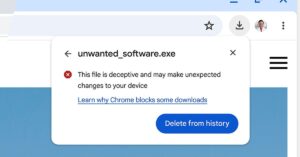/cdn.vox-cdn.com/uploads/chorus_asset/file/24647604/Core_I_O_hero.jpg)
A new security feature coming to Google accounts could inform you if your email address has been published on the dark web. At Google I/O today, the search giant announced plans to roll out a handful of new security features designed to better protect those using Google products and services, including spam protections for Google Drive and improved search history deletion in Maps.
The company is expanding its “dark web report” feature to all Gmail accounts in the US over the coming weeks, which scans to check if your Gmail address is appearing on the dark web and advises on steps that users can take to bolster their online security. The password manager built into the Chrome browser already does a fairly good job of nagging you to keep your data protected, but this goes a step further.
Personal information like email addresses can find its way onto the dark web as a result of data breaches at services and platforms you may be signed up for. This information can then be sold and used by cybercriminals in a variety of ways, including identity theft, banking fraud, and phishing scams.
Google’s dark web reporting tool isn’t a new feature, but it was only previously available to folks in the US who subscribed to Google One, the company’s expanded Cloud storage platform. Google also says the tool will eventually be available to “select international markets,” though it didn’t specify which countries would get access.
The spam protections typically found in Gmail are now being expanded to Google Drive, with a new view rolling out that’s designed to help users control what they want to designate as spam. Drive will automatically classify obvious offenders into the spam view to prevent users from accidentally accessing any “unwanted or abusive content,” and Google claims that the new view makes separating and reviewing files much easier.
It’s also getting easier to delete search history in Google Maps. You can already clear your search history via the “Web & App Activity” tab within your account settings, but now, Google is adding the ability to delete recent searches directly within Maps with a single tap. There’s currently no word on what regions will receive the new feature.
Finally, Google is also bolstering security services used by other platforms and organizations. Google’s Content Safety API, used by companies like Facebook and Yubo to identify and remove child sexual abuse material (CSAM) from the web, is being expanded today to include video content. This was something previously managed by CSAI Match, YouTube’s proprietary technology for detecting CSAM in online videos. Google has not mentioned if the API’s new video functionality is replacing CSAI Match or how the two services differ.
Google hasn’t provided an exact release date for many of these features, so we’ve asked for clarification and will update this story if we hear back. There are a few other announcements coming out of Google I/O today worth checking out in the meantime, including a host of new AI-powered features for Search and 3D routes for Google Maps.





